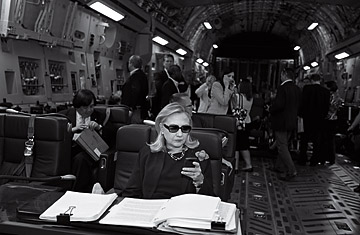
Clinton aboard a C-17, on her way to meet with rebel leaders in Tripoli.
(4 of 6)
In some respects, America's limited power abroad mirrors Clinton's predicament as the 67th Secretary of State. Though Obama practically begged her to become his top diplomat after the 2008 campaign, the job came with many strings attached. The White House handpicked her deputy and quietly vetoed other appointments she wanted to make. While Clinton worked to build a relationship with her former adversary in the West Wing, her chief of staff, Cheryl Mills, played bad cop, having "tough conversations," according to one official, with Deputy National Security Adviser Denis McDonough over appointments and locking horns with the Treasury Department. Tension between the State Department and the National Security Council (NSC) continues.
On policy, Clinton spoke out at key meetings, but on some big decisions, such as abandoning the push to close Guantnamo Bay, limiting the size of the Afghanistan troop surge and demanding that Israel stop settlement activity, Obama made the final call without her. Clinton's voice is heard: she meets weekly with Obama one on one and also weekly with his National Security Adviser and Secretary of Defense. And in daily, formal NSC meetings, she makes her arguments. But the final debates in this Administration are held in small rooms among Obama's closest White House aides. Which Clinton, with her famously tight inner circle, might appreciate.
Clinton has sought other avenues of influence, working to bolster her department's clout, expanding control over U.S. foreign aid strategy and finding new sources of funding for it in the Pentagon's deep pockets. She also lashed her bureaucracy to more-powerful ones, boosting the number of her political advisers at the Defense Department from 15 to 100 in an attempt to steer Pentagon policy to State's benefit. In both instances, it helped that in former Defense Secretary Robert Gates, Clinton had a partner in trying to build up State's role in national security. The two found common cause on the size and duration of the Afghanistan surge and on not releasing photos of the dead Osama bin Laden. She is still working to establish the kind of close collaboration she had with Gates with his successor, Leon Panetta, who became Bill Clinton's chief of staff in July 1994.
Abroad, Clinton has worked to broker the marriage of diplomacy and technology. She boosted State's budget to pay for computer training and surveillance-evading software for dissidents, some of it top secret, from $15 million to $45 million. State claims the Syrian revolution has continued in part because of a sanctions waiver for surveillance-evading software Clinton sought and won despite resistance from other agencies in 2009. In Libya last July, the rebels had salvaged telecommunications equipment from retreating Gaddafi forces in the eastern part of the country but could make only local calls and had no Internet access. State quietly helped restore full services beyond Gaddafi's control and got access to fiber-optic-cable networks that didn't run through Tripoli, allowing the rebels to gin up cash from abroad.
